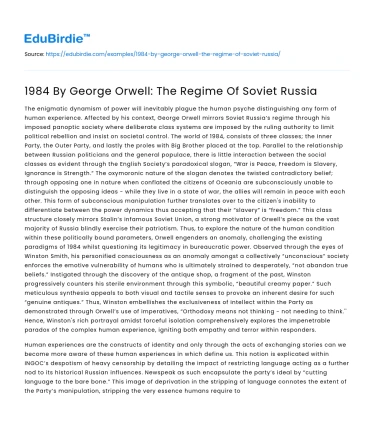The enigmatic dynamism of power will inevitably plague the human psyche distinguishing any form of human experience. Affected by his context, George Orwell mirrors Soviet Russia’s regime through his imposed panoptic society where deliberate class systems are imposed by the ruling authority to limit political rebellion and insist on societal control. The world of 1984, consists of three classes; the Inner Party, the Outer Party, and lastly the proles with Big Brother placed at the top. Parallel to the relationship between Russian politicians and the general populace, there is little interaction between the social classes as evident through the English Society’s paradoxical slogan, “War is Peace, Freedom is Slavery, Ignorance is Strength.” The oxymoronic nature of the slogan denotes the twisted contradictory belief; through opposing one in nature when conflated the citizens of Oceania are subconsciously unable to distinguish the opposing ideas - while they live in a state of war, the allies will remain in peace with each other. This form of subconscious manipulation further translates over to the citizen's inability to differentiate between the power dynamics thus accepting that their “slavery” is “freedom.” This class structure closely mirrors Stalin’s infamous Soviet Union, a strong motivator of Orwell’s piece as the vast majority of Russia blindly exercise their patriotism. Thus, to explore the nature of the human condition within these politically bound parameters, Orwell engenders an anomaly, challenging the existing paradigms of 1984 whilst questioning its legitimacy in bureaucratic power. Observed through the eyes of Winston Smith, his personified consciousness as an anomaly amongst a collectively “unconscious” society enforces the emotive vulnerability of humans who is ultimately strained to desperately, “not abandon true beliefs.” Instigated through the discovery of the antique shop, a fragment of the past, Winston progressively counters his sterile environment through this symbolic, “beautiful creamy paper.” Such meticulous synthesia appeals to both visual and tactile senses to provoke an inherent desire for such “genuine antiques.” Thus, Winston embellishes the exclusiveness of intellect within the Party as demonstrated through Orwell’s use of imperatives, “Orthodoxy means not thinking - not needing to think.'' Hence, Winston's rich portrayal amidst forceful isolation comprehensively explores the impenetrable paradox of the complex human experience, igniting both empathy and terror within responders.
Human experiences are the constructs of identity and only through the acts of exchanging stories can we become more aware of these human experiences in which define us. This notion is explicated within INGOC’s despotism of heavy censorship by detailing the impact of restricting language acting as a further nod to its historical Russian influences. Newspeak as such encapsulate the party’s ideal by “cutting language to the bare bone.” This image of deprivation in the stripping of language connotes the extent of the Party’s manipulation, stripping the very essence humans require to cultivate human experiences and ultimately identity. This further restriction is fictitiously coined through the ambiguous forms of censorship such as, “plusgood” and “double-plus good” which effectively cleanse “useless shades of meaning.” This enacts true linguistic decay, which is not merely the regulation of language, instead of the stemming discouragement in which language ceases the existence of ideas. This practice creates an idealization of Big Brother which can “announce that two and two made five.” This in itself is an appropriation of the Soviet Unions’ slogan “two plus two the enthusiasm of the workers equal five,” showcasing the vitality of the individual in compliance. Yet in 1984, this oxymoron is used as a demonstration of power and evidence of the degraded individual identity of the populace for the party. The symbol paradoxically represents both the psychological conditioning of the populous and the mental autonomy granted to Winston through the validation of himself when he realizes, “the very existence of external reality was tacitly denied by their philosophy.” This symbol also alludes to the inconsistencies of storytelling and the ways in which it can be used to mislead and manipulate others, in such a way that Big Brother is so easily able to manipulate the populace through its blatant use of propaganda. This culminates through the collective pronoun, “comrade” which tarnishes the individual experience to a general pronoun. However, Orwell does not completely eliminate the centrality of human experience, hinting at hopes even in the face of tragedy and emotive complex sorrows in the foreground where beauty progressively blossoms the allegorical “coral...paperweight,” and most importantly the proles. The satirical play on the proleriates undermines hope within the novel, where a single shift in the collective could instigate the thought that “if there is hope...it lies in the proles.” The proles live in a way “natural to them, a sort of ancestral pattern,” explicating the withstanding aspect of the human condition. Affected by Marxist influence, Orwell reveals the “conscious of their own strength” where faith is emblematically explored through the “red armed woman” who is metaphorically resilient in the face of complete oppression. Therefore, Orwell highlights the inconsistencies of the human experience through the engendering of community and strength in connection.
Save your time!
We can take care of your essay
- Proper editing and formatting
- Free revision, title page, and bibliography
- Flexible prices and money-back guarantee






 Stuck on your essay?
Stuck on your essay?

